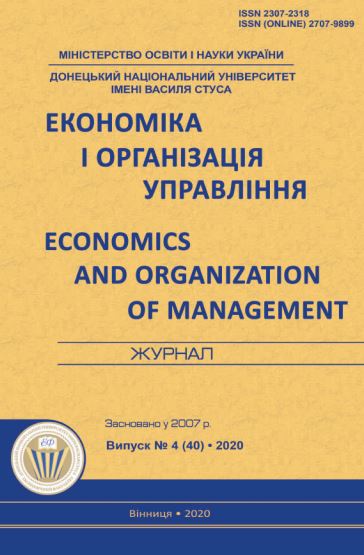Paradigm of strategic development of the management capacity of the enterprise
DOI:
https://doi.org/10.31558/2307-2318.2020.4.23Keywords:
managerial potential of the enterprise; development paradigm; strategic management; operational management; situational management; personnel management at the enterprise; digitalization of the enterprise; innovation processes; corporate values of the enterpriseAbstract
The basic concepts of the strategic management paradigm are studied. Its adaptation for formation of the mechanism of strategic development of administrative potential of the enterprise and its effective realization is executed. Emphasis is placed on the fact that the modern paradigm of strategic development of managerial capacity is based on a person-centered approach. The basis of the approach is the potential of management staff in the target strategic areas of enterprise development. For a modern enterprise, the strategic goals of the development of its management system and capacity should be such as digitalization of the enterprise, the development of its corporate culture; introduction of modern management methodologies, etc. Discussions on comparing the advantages and disadvantages of strategic, situational and process management became the basis for the formation of a paradigmatic structure. It provides for the definition of the overall strategy, strategic activities, scenarios for their implementation in accordance with management situations, taking into account the management signals of external and internal environments. Management scenarios are formed on the basis of a set of management processes. Description and analysis of business processes allows to determine the roles of each participant in the process and the results of its implementation. The general management procedures developed according to the defined scenarios should correspond to the defined purposes and values both of the enterprise, and its personnel. Involvement and motivation of staff to identify personal and professional potential is the basis of the paradigm model of development of managerial potential of the enterprise. The proposed paradigm of strategic management of the development of managerial potential of the enterprise is based on known approaches to the formation of a synergetic system of strategic, situational, operational and process management to achieve the goals of enterprise development. Emphasis on the development of management staff potential, effective management decision-making procedures and implementation of management processes allows to form such a formula for effective development of SCP - active dynamic development of management staff potential, based on the values of the enterprise and its corporate culture in the introduction of innovative management methodologies. implementation of management decisions with the help of modern information technologies. The paradigm of strategic development of SCP is based on the delimitation (decomposition) of goals and functions of different types of management with their subsequent integration into a single system (composition) of management of SCP development at all levels from general enterprise to self-management and individual development.
References
Кун Т. Структура научныхреволюций; составитель В. Ю. Кузнецов; пер. с англ. М. : ООО “Издательство АСТ’, 2003. 605 с.
Ансофф И. Стратегическоеуправление; сокр. пер. с англ. М. : Экономика, 1990. 384 с.
Каасон М. Інформація та організація. Новий погляд на теорію фірми; пер. з англ. І. Ободовського. К. : Вид. дім “Києво-Могилянська академія", 2008. 366 с.
Джейкобс Р. Стратегическиеперемены в реальномвремени: Эффективноевнедрение метода стратегическихперемен – путь к успеху; пер. с англ. Днепропетровск : Баланс-Клуб, 2004. 408 с.
Друкер П. Менеджмент. Вызовы ХХI века. М. : Манн, Иванов и Фербер, 2012. 256 c.
KellyK. New Rules for the New Economy Radical strategies 10 for a conned world. New York : Penguin Group, 1998. 180 p.URL: https://kk.org/mt-files/books-mt/KevinKelly-NewRules-withads.pdf (access date:20.12.2019)
Чорна Л. О., Зачоса О. Д. Механізм управління розвитком людського капіталу за упов активізації економіки знань. Економіка і держава. 2017. № 3. С. 36-38.
Дороніна О. А. Формування парадигми сучасної кадрової політики як підґрунтя соціально–економічного зростання. Формування ринкових відносин в Україні. 2015. № 10. С. 132-136.
Strategies for the New Economy Skills as the Currency of the LabourMarketJanuary 2019 incollaboration with WillisTowersWatson. WorldEconomicForum. Geneva. 2019. URL: http://www3.weforum.org/docs/WEF_2019_Strategies_for_the_New_Economy_Skills.pdf (access date:20.12.2019)
Биннер Х. Управлениеорганизациями и производством: от функциональногоменеджмента к процессному; пер. с нем. М. : АльпинаПаблишерз, 2010. 282 с.
Помазун О. М. Особливості прийняття рішень із управління бізнес-процесів підприємства. Інструменти регулювання національної економіки в умовах сучасних глобальних викликів: матеріали Міжнар. наук.-практ. конференції (Хмельницький, 8-10 жовт. 2015 р.). Хмельницький : ХНУ, 2015. С. 64-66.

